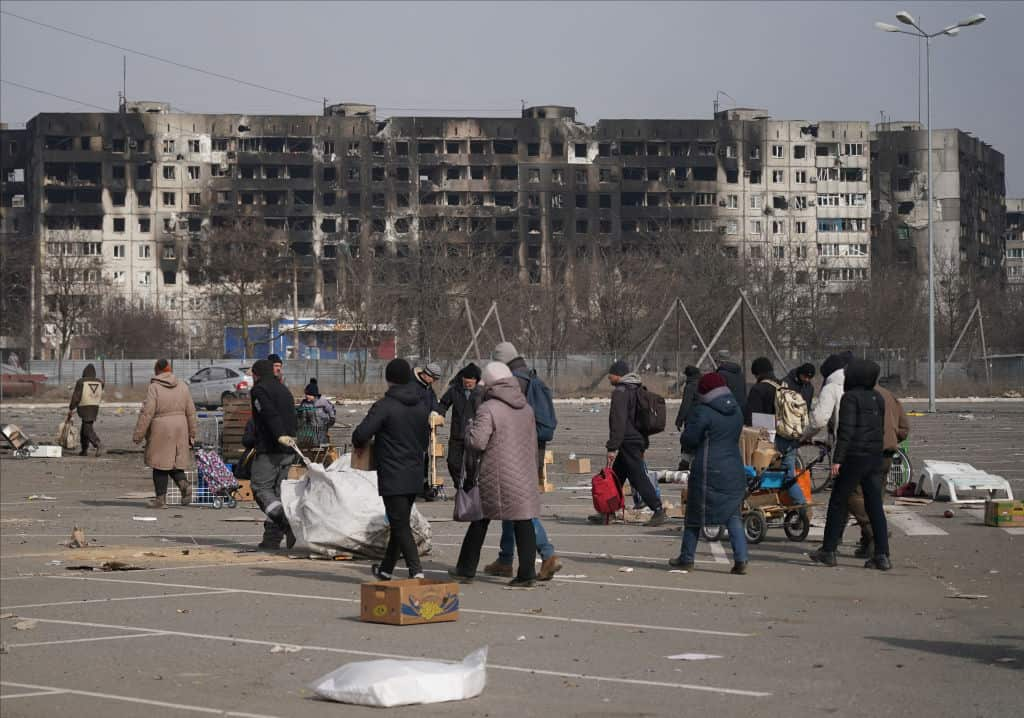Ukraine President Volodymyr Zelenskyy has said a Russian demand of Ukrainian neutrality — a key issue for Moscow at conflict negotiations — was being closely looked at by Kyiv's negotiators.
"This point of the negotiations is understandable to me and it is being discussed, it is being carefully studied," Mr Zelenskyy said during an interview with several independent Russian news organisations.
The Kremlin earlier this month said Sweden and Austria offered models of neutrality that Ukraine could adopt to help end Russia's invasion of Ukraine.
Ukraine rejected the proposal, saying only Kyiv could design a system that would be acceptable to Ukrainians.
Speaking with Russian journalists, Mr Zelenskyy accused Russian leader Vladimir Putin of dragging out negotiations and prolonging the conflict.
"We have to come to an agreement with the President of the Russian Federation. But to reach an agreement, he has to get up from where he is and come and meet me," Mr Zelenskyy said.
Russian media regulator, Roskomnadzor, warned media outlets against broadcasting the interview with Mr Zelenskyy saying they could be subject to investigation and action could be taken against them.
Negotiations to end more than a month of fighting in Ukraine have focused on Ukraine staying out of NATO, disarmament and security guarantees.
The two sides are due to meet for a second round of face-to-face talks next week in Turkey.
Warns of escalation in fighting
Ukraine on Sunday warned of a possible escalation in fighting around the besieged southern port city of Mariupol after Moscow said it was focusing its military resources on capturing the eastern Donbas region.
"This means a potential or sharp deterioration around Mariupol," an adviser to the head of the President's office, Oleksiy Arestovich, said in a video statement.
He was referring to a surprise Russian statement on Friday that it was time for Moscow to set as its "main goal" controlling Donbas, an eastern region already partly held by Russian proxies.
"This gives us hope in the area of Kyiv, Chernigiv, Sumy and Kharkiv regions, that we will drive the enemy out of here," Mr Arestovich said, referring to north and eastern regions.

He also announced that Ukrainian forces were counter-attacking against invading Russian troops in those areas, referring to small, tactical offensives.
Russian President Vladimir Putin ordered troops into Ukraine on 24 February with the aim of defending pro-Moscow separatists to and "demilitarise and de-Nazify" the country.
The Russian announcement on Friday would amount to a sharp change of course with much limited goals that would not include an assault on the capital.
Moscow's month-long invasion on its pro-democracy neighbour has largely stalled with no major recent advances and Ukrainian forces even able to counterattack in places.
Joe Biden's 'gaffe' on Vladimir Putin scrambles US message
Russia's possible shift in focus came as President Joe Biden visited elite US troops serving with NATO just across the border in Poland and appeared to call for Mr Putin's exit, sparking an administration rush to course-correct.
Mr Biden's comment that the Russian president "cannot remain in power" - delivered in Warsaw at the close of three days of marathon diplomacy - was termed "a horrendous gaffe" by one Republican senator.
A senior US analyst said it could have the effect of lengthening the war.
And even France's president warned such language could "escalate" a conflict the United States and its NATO allies have sought at all costs to contain, and undercut Western efforts to help suffering Ukrainians.
The remark came as Mr Biden wound up a forceful speech on Saturday capping what had been a widely-praised European visit, aimed at presenting a determined front against Russia's invasion.
His ad-libbed words - "For God's sake, this man cannot remain power" - caught even US advisors off guard, representing a stark departure from oft-stated American policy.
The White House sprung immediately into action, clarifying within minutes that Biden was not advocating "regime change" in Russia.
But the comments by Mr Biden - who hours earlier called Mr Putin a "butcher" - drew predictable fury from Moscow, raised eyebrows in allied countries, and sent the president's advisors into high gear to mollify the criticism.
US Secretary of State Antony Blinken, in Jerusalem, joined in forcefully denying Biden was calling for Putin's ouster.
Mr Biden's point, Mr Blinken said, was that "Putin cannot be empowered to wage war, or engage in aggression against Ukraine, or anyone else".
The choice of Russia's leader, Mr Blinken said, is "up to the Russians."
President Emmanuel Macron of France, a close US ally who has spoken frequently with Mr Putin since the invasion, warned the West not to "escalate in words or actions" - or risk hampering vital humanitarian efforts, including hopes of evacuating the devastated city of Mariupol.
With SBS News

